Description
Weight: 10 gm
Description:
- Cordyceps can increase energy, boost health, detox the body, increase oxygen uptake, and improve immune function.
- It is highly revered by athletes for its ability to greatly improve performance, build physical power and strength, stamina and promote fast recovery.
Uses:
Dried Cordyceps is highly effective and can be added to coffee, tea, smoothies, shakes, soups, raw chocolate, and more.
Nutritional value:
Cordyceps sinensis contains a broad range of compounds that are considered nutritional.
The following components are all included in Cordyceps sinensis:
- Essential amino acids cannot be synthesised by the body but are necessary for good health. Amino acids are essential for developing the muscles, tendons, organs, glands, nails and hair. Growth, repair and maintenance of all cells are dependent upon amino acids.
- Vitamin E is essential in keeping the cells of muscle, heart, testes, liver and nerves alive and functioning. Vitamin E deficiency causes damage and death of cells and tissues in these organs.
- Vitamin K is essential for normal blood functions. Without Vitamin K, blood cannot clot. Vitamin K also participates in the activation of bone proteins, which greatly enhances calcium-binding properties. Low levels of vitamin K have been associated with low bone-mineral density.
- Vitamin B1 is essential for carbohydrate metabolism, energy and production of hydrochloric acid, which is necessary for proper digestion. Vitamin B1 is also important for the proper functioning of the nervous system. Vitamin B2 is essential for energy metabolism, cell formation and growth, antibody production and skin health. Vitamin B12 is essential for processing carbohydrates, proteins and fats and helps to make blood cells.
- Essential Fatty Acids
There are two major classes of unsaturated fatty acids – Omega-6 & Omega-3 class and Omega-9 class. Fatty acids regulate blood pressure, cholesterol and triglyceride levels, have a positive impact in the cardiovascular system, and are required for normal brain development and function. - Cordyceps sinensis includes more than 80 types of enzymes, including Coenzyme Q10. Enzymes are involved in all metabolic processes. Digestion and absorption of nutrients, synthesis and breakdown of proteins, nucleic acids, fats, carbohydrates and other compounds in cells and tissues are not possible without the enzymes. Enzymes contribute to every body function – breathing, muscle contraction, reproduction, and many others.
- Cordyceps sinensis includes monosaccharides, disaccharides, oligosaccharides and many complex polysaccharides. Research has shown that polysaccharides effectively regulate blood sugar and facilitate antimetastatic and antitumour effects.
- Proteins are present in and vital to every living cell. In the form of skin, hair, callus, cartilage, muscles, tendons and ligaments, proteins hold together, protect and provide structure to the body of a multi-celled organism. In the form of enzymes, hormones, antibodies and globulins, proteins catalyse, regulate and protect the body chemistry. In the form of haemoglobin, myoglobin and various lipoproteins, proteins transport the oxygen and other substances within body. Peptides are commonly used in the treatment of cancer, neurodegenerative diseases and metabolic disorders.
- Sterols such as campesterol or phytosterol can prevent ‘bad’ cholesterol from being absorbed into the bloodstream. Instead of clogging up arteries and impairing artery function, the cholesterol is eliminated as waste.
- In medicine, several nucleosides are used as antiviral or anticancer agents.
- Potassium is important in maintaining fluid and electrolyte balance in the body. Potassium regulates heart condition and supports osmotic pressure. Potassium is also important for carbohydrate metabolism.
- Sodium maintains electric potential in human body tissues and is essential for nerve and cognitive functioning. Sodium regulates the osmotic pressure balance between cells and is one of the important elements for mineral metabolism.
- Calcium is a major material used in mineralisation of bones, and its presence is essential for maintaining the proper function of muscles and nerves.
- Magnesium is an essential nutritional component for a healthy diet and is needed for more than 300 biochemical reactions in the body. Amongst other benefits, magnesium helps maintain normal muscle and nerve function, maintains regular heart rhythm, supports a healthy immune system and keeps bones strong. Magnesium also helps regulate blood sugar levels and promotes normal blood pressure and is known to be involved in energy metabolism and protein synthesis.
- Iron is essential in all living organisms and normal human physiology. Iron is involved in oxygen transport and regulation of cell growth and differentiation. A deficiency in iron limits oxygen delivery to cells, resulting in fatigue, poor work performance and decreasing immunity.
- Copper is an essential microelement for the health of all living organisms. Copper plays an important role in facilitating iron uptake. Deficiency of copper may cause anaemic symptoms.
- Manganese helps to maintain healthy bone structure and is involved in building essential enzymes for developing bones. Manganese acts as a co-enzyme to assist metabolic progression in the human body. Manganese is also actively involved in forming connective tissues, absorption of calcium, proper functioning of the thyroid, sex hormones, regulation of blood sugar levels and metabolism of fats and carbohydrates.
- Zinc is an essential trace element for cell growth and division, fertility and the immune system. Zinc accelerates the renewal of the skin cells and is essential for maintaining healthy vision.
- Selenium helps maintain the immune system. Selenium is also known as an antioxidant and catalyst for the production of active thyroid hormones. Selenium is required for sperm motility and may reduce the risk of miscarriage.
- Silicon is important for the development of bones and connective tissue. Currently, nutritionists focus on the role of silicon in the prevention and treatment of osteoporosis.
- Nickel presents in the liver, skin and the endocrine gland.
- Vanadium may act as a co-factor for enzymes involved in blood sugar metabolism, lipid and cholesterol metabolism, bone and tooth development, fertility, thyroid function, hormone production and neurotransmitter metabolism.
Shelf Life: Dried Cordyceps Mushrooms have a shelf life of up to a year.

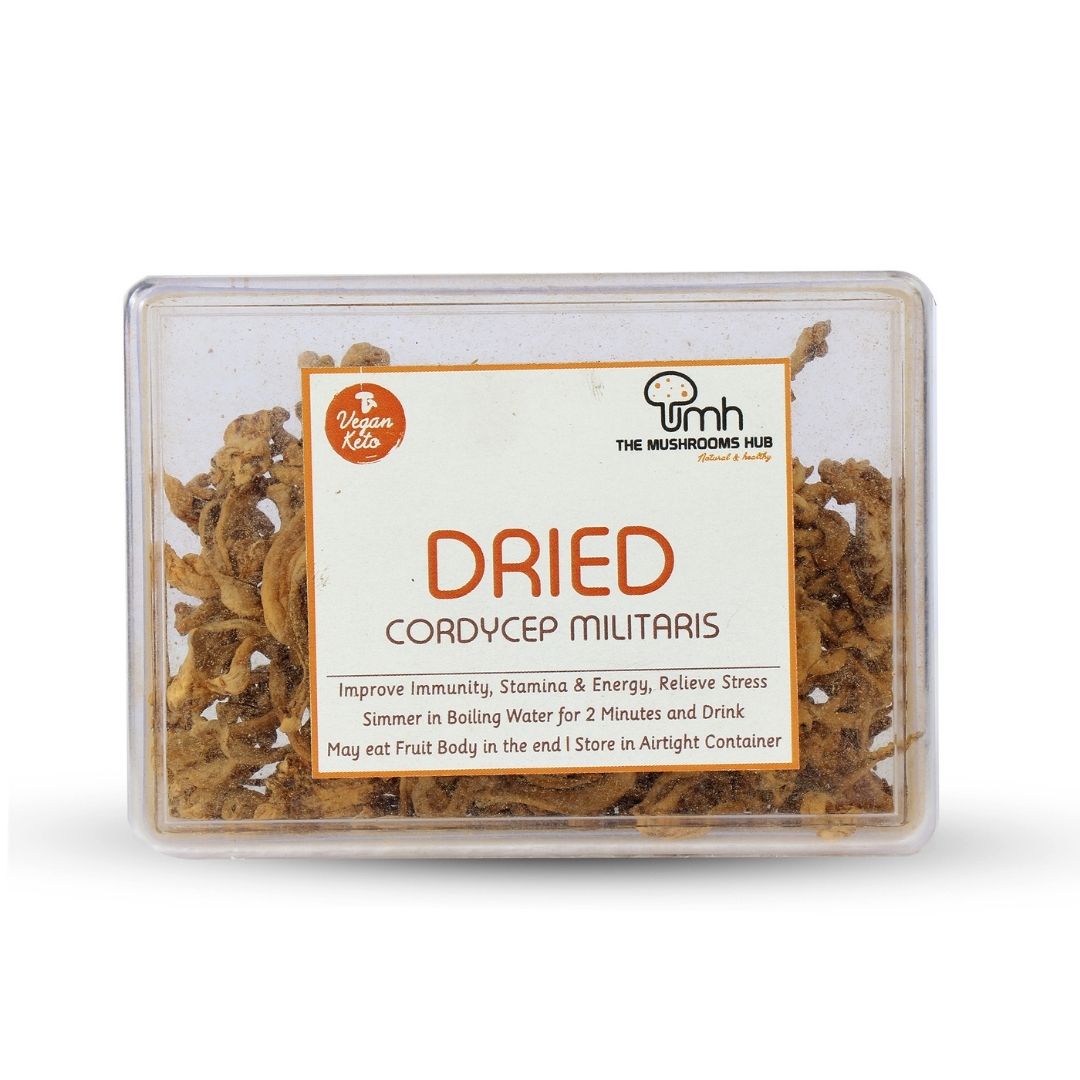
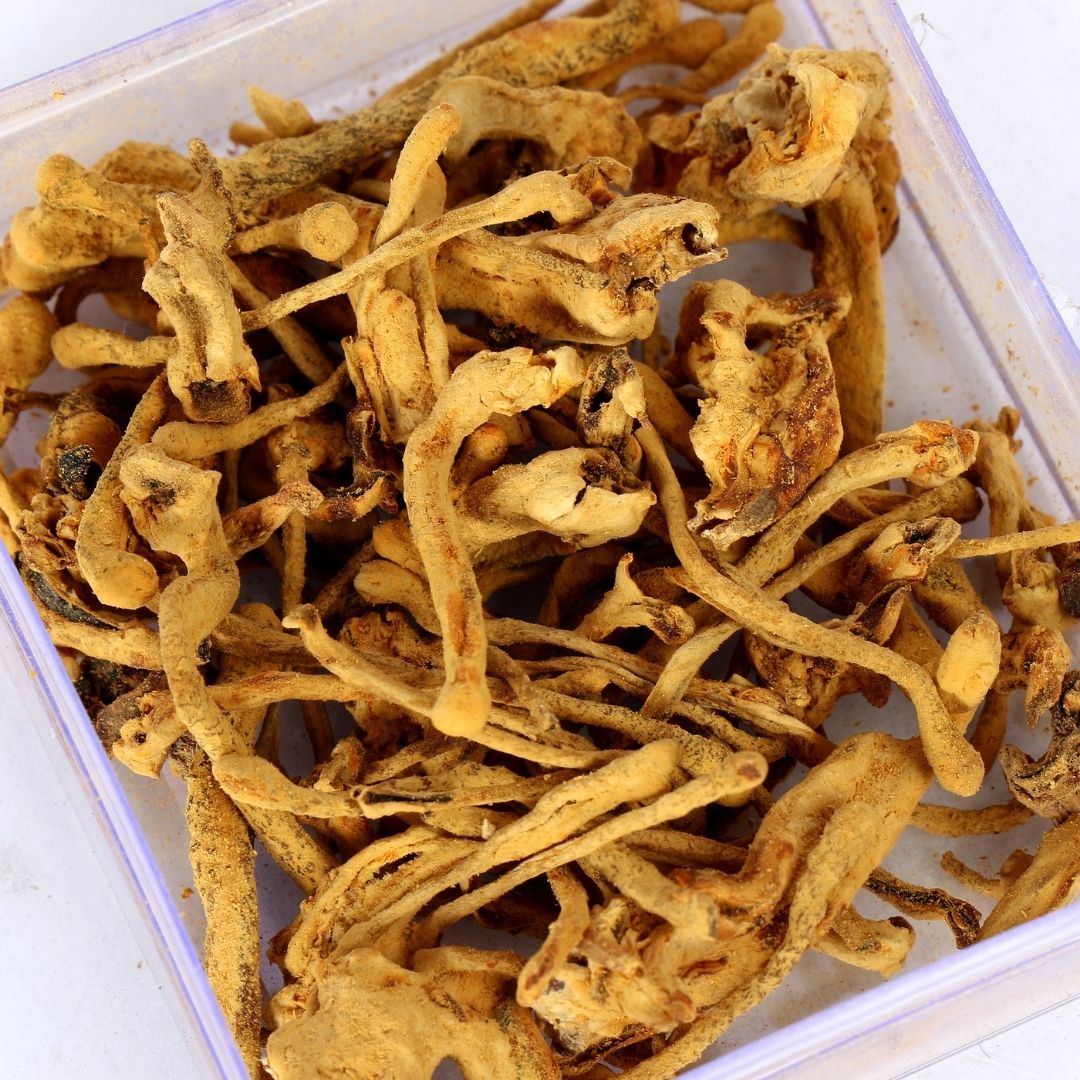
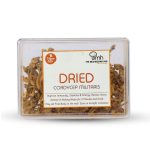
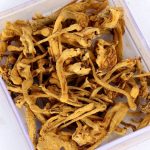
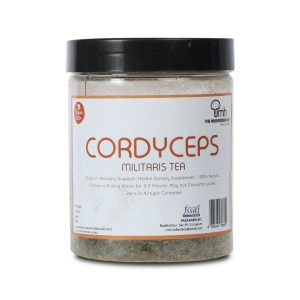
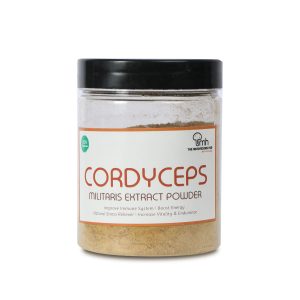
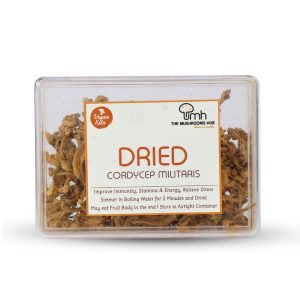
There are no reviews yet.